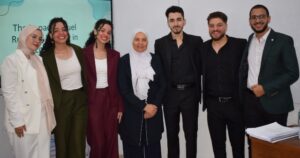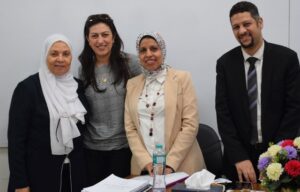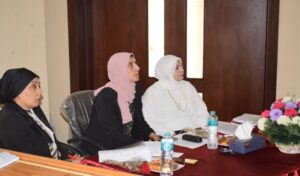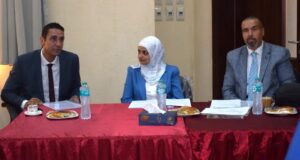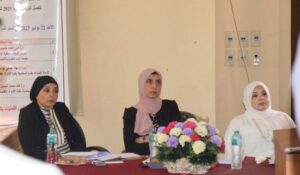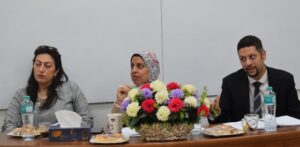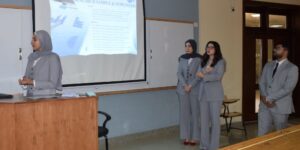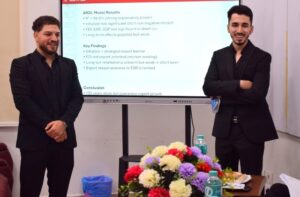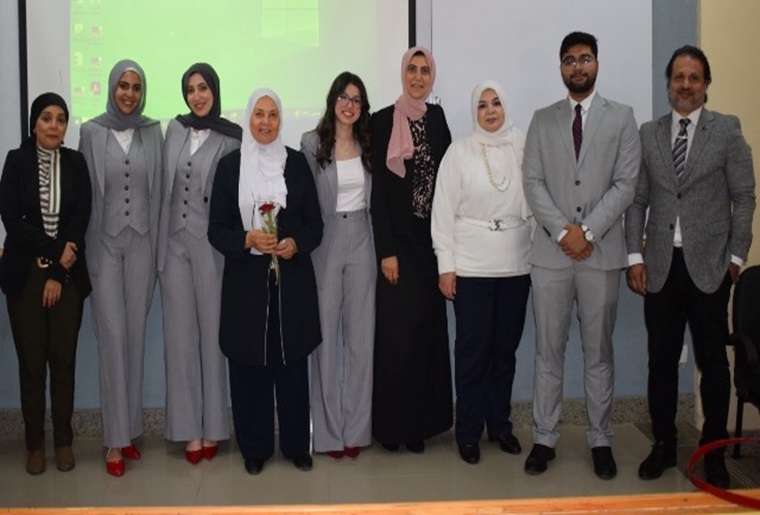In addition to challenges facing various financial and economic sectors, Faculty of Management at Egyptian Russian University discusses graduation projects which align with sustainability goals… photos
Dr. Sherif Fahkry Mohamed Abd-el-Naby, President of the Egyptian Russian University, announced that the University’s Faculty of Management, Economics and Business Technology discussed a number of graduation projects at the end of the second semester of the academic year 2024/2025. He asserted that graduation projects provide the students with the opportunity to apply what they have learned in their field of specialization and implement it in the field. This is in order to qualify them to join the labor market. These projects receive special attention and support from Dr. Mohamed Kamal Al-Sayed Mustafa, Chairman of the University’s Board of Trustees, and the University’s management.
In the same context, Dr. Al-Tahera Al-Sayed Hameyah, Dean of the Faculty of Management, Economics and Business Technology at the Egyptian Russian University (ERU), explained that the faculty management discussed distinguished graduation projects submitted by fourth year students from its various departments, which demonstrated their research and analytical skills. Two projects were presented and discussed at the Accounting Department. The first project was titled “The Impact of Digital Transformation on Financial Risk in Egyptian Banks – an Empirical Study”, prepared by the students: Mai Farouk, Nour Madeen, Shahd Essam, and Zyad Medhat.
The Dean of the Faculty of Management, Economics and Business Technology stated that the study’s findings indicated that increased levels of digital transformation in Egyptian banks are positively associated with the improvement of financial stability indicators and the reduction of some types of risks, especially liquidity risk. This goes in line with the sustainable development goals (SDGs), and most especially goal 9 which is related to industry, innovation and infrastructure, and goal 8 on economic growth and proper work.
Dr. Al-Tahera Al-Sayed Hameyah added that the second project, titled “The Impact of Financial Statement Manipulation on Investor’s Behavior – an Empirical Study,” was prepared by the students: Omar Hammam, Youssef Sayed, Youssef Mohamed, Moataz Ahmed, and Mohamed Zein. She pinpointed that the team concluded that financial statement manipulation has a key impact on investor decisions and distorts indicators such as the price-to-earnings ratio (P/E) and auditing quality. This weakens trust in the financial market and negatively affects transparency, which is a fundamental value for achieving sustainability in the business environment in accordance with the principles of good governance and responsible financial disclosure practices.
The Dean of the Faculty of Management, Economics and Business Technology highlighted that the discussion committee included:
– Dr. Nehad Hosny Youssef, Assistant Professor at Accounting Department (Head of Committee).
– Dr. Hend Mohamed Al-Gamil, Lecturer at Accounting Department at the Faculty (Committee Member).
– Dr. Mona Ahmed Shemis, Lecturer at Accounting Department at the Faculty of Management, Delta University (Committee Member).
On their part, the committee members paid tribute to the students’ high academic standard and their ability to apply scientific research tools, reflecting their readiness to enter the labor market and contribute to the development of Egypt’s business and financial governance system.
In another context, Dr. Al-Tahera Al-Sayed Hameyah said that students of the Department of Economics, under the supervision of Dr. Engy Raouf, the Faculty’s Vice Dean, presented distinguished graduation projects which reflect their awareness of contemporary economic challenges and their commitment to employing academic knowledge in serving development issues, which include the following ones:
– The first project, titled “The Impact of Natural Resource Revenues on Poverty in Egypt,” was prepared by the students: Zeina Masoud and Sarah Masoud. It aims at assessing the extent to which poor groups benefit from natural resource revenues, in support of the first goal of the sustainable development goals, which is related to eradicating poverty, and enhancing public policies to ensure a fair distribution of the state revenues in accordance with social justice in “Egypt’s Vision 2030.” The outcomes showed a positive relationship between higher fuel revenues and the increase in poverty rates, indicating that resource revenues are not always translated into improved conditions for the poor. This highlights the need for more inclusive and equitable wealth distribution policies, which go in line with Egypt’s Vision 2030.
– The second project, titled “The Impact of Financial Technology on Private Investment in the Middle East and North Africa Region,” was prepared by the students: Salma Hatem and Mohamed Gomaa. It highlights the role of digital innovation in stimulating investment, in accordance with Sustainable Development Goal 9, which is concerned with industry and innovation, and supports the movement toward digital transformation and a knowledge-based economy within the framework of “Egypt’s Strategy 2030”. The study found out that increased activity in startups in the field of financial technology is positively associated with growth in private capital formation, which reflects the importance of investing in digital infrastructure in order to push investment forward and to support digital transformation as part of “Egypt’s Strategy 2030.”
– The third project, titled “The Impact of Foreign Direct Investment on Exports in Egypt,” was prepared by the students: Hossam Mohamed and Mohamed Saad. It focuses on boosting domestic exports by attracting foreign investments that are directed towards productive sectors, which means achieving the eighth sustainable development goal, which is related to economic growth and proper work, and which supports the global competitiveness of the Egyptian economy.
The Dean of the Faculty of Management, Economics and Business Technology added that there is a long-term relationship between foreign investment and exports. She emphasized the importance of directing investments toward high-value industrial and technological sectors in order to support Egypt’s export capacity and achieve sustainable economic competitiveness. She highlighted as well that these graduation projects represent a successful model for linking academic study with development issues, and reflect the department’s keenness to prepare young cadres who are capable of effectively contributing to building a more sustainable and fairer economy.
In the same vein, Dr. Al-Tahera Al-Sayed Hameyah stated that the Business Administration Department at the Faculty was keen to enhance academic excellence and link theoretical and practical aspects. Discussions of graduation projects were held for students in the Marketing and Finance programs, in the presence of elite faculty members from inside and outside the university, under the supervision of Dr. Dina Farouk, Head of Business Administration Department and Assistant Professor of Business Administration at the Faculty. The projects addressed modern topics which reflect the students’ awareness of digital and economic market issues and highlight their readiness for joining the labor market.
The Dean of the Faculty of Management, Economics and Business Technology pointed out that the Marketing Program projects were supervised by Dr. Mona Hamed Moussa, Assistant Professor of Marketing at the Faculty. The discussion committee included: Dr. Banseh Salah, Lecturer at Business Administration Dep. at the Faculty, and Dr. Marwa Mahmoud Ibrahim, Lecturer at the Faculty of Business Administration, Economics and Political Science at the British Egyptian University. The projects tackled various topics in the fields of digital marketing, consumer behavior, and brand management, most notably: the impact of online behavioral advertisement on consumers’ trends and impulse purchase motives, and the role of advertising as a mediator in the relationship between social media and online shopping behavior, as well as the impact of rebranding on customers’ loyalty, as well as the impact of influencers’ credibility on Gen Z’s purchase intentions.
Dr. Al-Tahera Al-Sayed Hameyah pinpointed that the financing program projects were prepared under the supervision of Dr. Osama Wagdy, Assistant Professor of Business Administration at the Faculty. The discussion committee included Dr. Walid Abu-Zeid, Assistant Professor of Business Administration at the International Academy for Engineering and Media Sciences (IAEMS), and Dr. Dina Farouk, Head of the Business Administration Department. Dr. Al-Tahera explained that the projects addressed vital issues such as the impact of sovereign credit ratings on entrepreneurship financing in Africa, the determinants of successful mergers and acquisitions in emerging markets, the impact of interest rate structures on the performance of real estate companies in emerging markets, and fair valuation of common stocks in the banking sector by using artificial intelligence.
At the conclusion of the discussions, the evaluation committees praised the students’ academic and research level, emphasizing that the submitted projects reflected a deep awareness of the rapid changes in the business environment and the capacity to employ modern scientific methodologies in analyzing practical realities.

